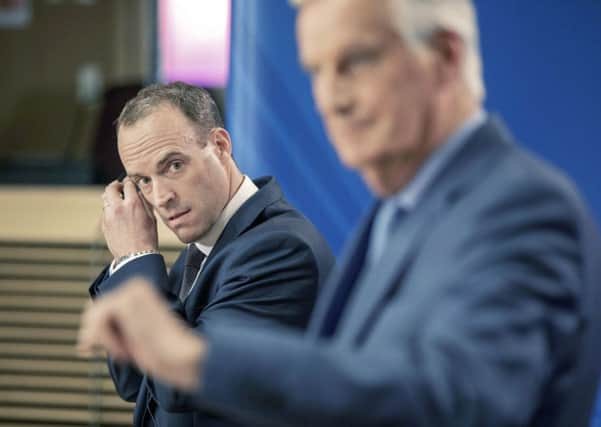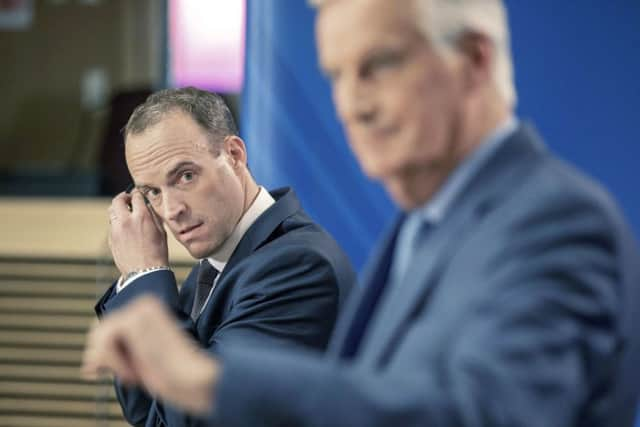EU '˜pushing UK to capitulation' says former Brexit minister


Eurosceptic Steve Baker said Brussels’ response to Theresa May’s Chequers plan was an attempt to get the UK to remain in both the single market and customs union.
European Union chief negotiator Michel Barnier dealt the Prime Minister a serious blow by rejecting a key plank of her Brexit strategy on Thursday.
Advertisement
Hide AdAdvertisement
Hide AdCentral to the Prime Minister’s plan, set out in a white paper a fortnight ago, is a “facilitated customs arrangement” under which tariffs charged at the border would be passed on to either the British or EU authorities depending on the destination of imported goods, but Mr Barnier made clear that was not acceptable to Brussels.


Mr Baker, who quit the Government over the Chequers plan, said the EU’s response was unsurprising.
“Chequers was bound to be the beginning of the EU pushing the UK to the unacceptable combination of EEA (European Economic Area) and customs union membership.
“On this road, eventually we will reach a fork between final capitulation or exit with no agreement.”
It would be “far better to find the political and administrative will to solve the problems of the UK border with Ireland through an advanced FTA (free-trade agreement)”.
It was “in our mutual interests to reach agreement”, he said, highlighting European Council president Donald Tusk’s offer of an “ambitious and advanced” FTA.
Meanwhile, Eurosceptics warned against any attempt to extend the Article 50 process.
Keeping the UK in the EU beyond March 2019 could provide extra time to find a way out of the current impasse over the nature of the future relationship, but the option was firmly rejected by Cabinet minister Liam Fox and influential backbencher Jacob Rees-Mogg.
Advertisement
Hide AdAdvertisement
Hide AdInternational Trade Secretary Dr Fox told Business Insider: “To attempt to extend our membership even longer, many voters would regard as a complete betrayal by the political class, and I think they would be right.”
Mr Rees-Mogg, leader of the pro-Brexit European Research Group of Tory MPs, said: “Liam Fox is right, extending Article 50 is the definition of failure for the Government.”
The Prime Minister was discussing her plan for leaving the European Union with Austrian Chancellor Sebastian Kurz and Czech counterpart Andrej Babis as she seeks to build alliances as the clock ticks down to the March 2019 Brexit date.
Both the Austrian and Czech governments have been critical of aspects of EU policy, particularly on migration, and Mrs May will hope she can use internal divisions within the bloc to push for a more flexible approach from Brussels to the Brexit negotiations.
But Czech state secretary for European affairs Ales Chmelar insisted there was unity behind Mr Barnier’s approach to the talks and the Prime Minister would struggle to find “loopholes” in the EU’s position.
He told BBC Radio 4’s Today programme: “There is a clear problem with the fact that the EU will not have a mechanism to control its borders and it would be delegated - without any EU control - to a third country, which would be Britain after March.
“So, that is the key principle. But also there is a larger general principle... it is almost physically impossible to have, at the same time, full regulatory autonomy on one side and full market access.
“There needs to be a certain balance between the rights and obligations in those terms.”
Advertisement
Hide AdAdvertisement
Hide AdThe UK is seeking to highlight the potential impact of the failure to reach a Brexit deal on individual economies across the bloc, hoping that domestic political interests may result in EU national leaders putting pressure on the Brussels bureaucracy to soften its stance.
But Mr Chmelar said the EU’s leaders had been fully involved in approving the mandate given to Mr Barnier and stressed that while the UK was an important trading partner it was not as vital as the Czech Republic’s neighbouring countries.
He acknowledged that “every member state of the EU is, to a certain extent, worried” about the prospect of a no-deal scenario, but the UK would be hit harder.
